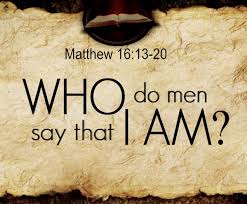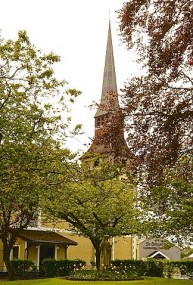21st Sunday in Ordinary Time, 23rd August 2020
Matthew: 16:13-20
 Many of us are familiar with the television programme ‘Who do you think you are? We see people research their backgrounds and wait to see what surfaces from their past! Jesus too had a past and we know it well. By the time he reached his early thirties most people had heard of him and his story: from very humble beginnings he had become well known as a healer, preacher and miracle worker. Yet, in Matthew 16:13-20, Jesus does not ask the disciples ‘Who do you think you are?’ but, ‘Who do you say I am?’
Many of us are familiar with the television programme ‘Who do you think you are? We see people research their backgrounds and wait to see what surfaces from their past! Jesus too had a past and we know it well. By the time he reached his early thirties most people had heard of him and his story: from very humble beginnings he had become well known as a healer, preacher and miracle worker. Yet, in Matthew 16:13-20, Jesus does not ask the disciples ‘Who do you think you are?’ but, ‘Who do you say I am?’
The readings for this Sunday provide a good example of how complex our search is as we look at one of the most contested passages in the Gospels – Peter’s identification of Jesus as the Messiah. Jesus calls Peter the ‘Rock’ on which he will build his church and gives Peter the keys to the kingdom of heaven – an authority that includes the power to bind and loose on earth and in heaven. These historical developments went beyond the evangelist’s concern. It is only in hindsight that this scene at Caesarea Philippi becomes important as the church emerges from its early roots in Palestine to become Christendom.
Caesarea Philippi, near Mount Hermon 40 km north of the sea of Galilee, is at the boundary of the Gentile world, and is primarily a Gentile city. In earlier times, it was known for the worship of Baal and Pan. In Jesus’ day it had a temple to Caesar. Jesus seems to go there to escape the Galilean crowds so that he might prepare his disciples for his journey to Jerusalem, which will soon begin (19:1), a journey that will end in Jesus’ death and resurrection. In choosing this place perhaps Jesus is giving us a hint of the concern for the whole world that he will make explicit in the Great Commission (28:19-20).
We give the disciples a lot of credit for dropping everything and following Jesus, and presumably they did so because they actually had an idea about who this ‘Jesus’ person was. However, they should really be beyond asking who Jesus is by this stage! And yet, He poses the question. This is even more peculiar when we stop to consider how much time the disciples had spent in his presence. He had performed miracle after miracle. Healed the sick. Fed the multitudes. Walked on water. And then the great teachings, parable after parable, sermon after sermon. They watched Jesus confound the Pharisees and Scribes. They heard Jesus teach about loving our enemies, about how to pray and how to live. Most of us would love to have heard teaching and instruction straight from the mouth of Jesus. The disciples were privileged to have had this experience, both among large groups of people and in the intimacy of their small company of twelve. They lived with the master and teacher, learning from his words and actions. And yet, Jesus asks, ‘Who do you say I am?’
In this question put by Jesus, ‘you’ is both emphatic and plural. It is addressed to the disciples at large. The people are free to believe whatever they want about Jesus, but Jesus has been carefully preparing these disciples to carry on his work. What they understand of him is critical. If anyone should have been able to say with certainty who Jesus was, it was the Twelve. And yet, the only one to respond was Peter, and his answer is profound: ‘You are the Christ’, he said, ‘the Son of the living God.’ Jesus replies, ‘Simon son of Jonah you are a happy man! Because it was not flesh and blood that revealed this to you but my Father in heaven.’ Peter did not arrive at his insight by spiritual astuteness. God had given him this understanding of Jesus. His insight comes by revelation not deduction. His understanding is a gift from God – a gift revealed to Peter, later revealed to the rest of the disciples, and of course it is revealed to us. This means that the revelation about who Jesus is comes spiritually, not mentally, or physically. Or, more simply, it means that Jesus cannot ‘demonstrate’ his way into our believing in him, or ‘teach’ his way into our believing in him, but essentially it is an act of faith on our part with a response from the Holy Spirit who confirms it to us, and so encouraged, we can meet the difficulties and limitations that are part of daily life.
There is nothing safe about this question. How could there be? There is nothing safe about Jesus or the life to which he calls us. Jesus’ question is not so much about getting the right answer as it is about witnessing and testifying to God’s life, love and presence in our lives and the world. It is less about our intellect and more about our heart. It is grounded in love more than understanding. It moves us from simply knowing about Jesus to knowing him, which is a far more life-changing experience.
Sr Máiréad Morrissey O.P.
